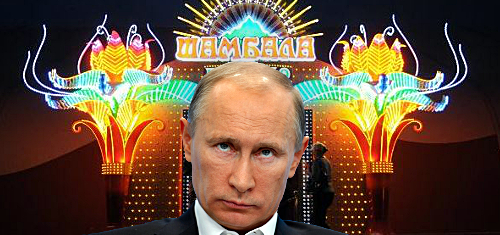 Casino operators in Russia’s Azov-City gaming zone have officially been given a New Year’s Day 2019 deadline for shutting down their operations.
Casino operators in Russia’s Azov-City gaming zone have officially been given a New Year’s Day 2019 deadline for shutting down their operations.
On May 1, Russian president Vladimir Putin (pictured) stopped purging dissidents long enough to put his signature on an amended federal law that calls for all casino operations in the so-called Azov-City gaming zone in the southwestern Krasnodar Krai region to cease business effective Jan. 1, 2019.
As bad as this sounds for the three casinos currently plying their trade in Azov-City, the law Putin signed actually extended a previous shutdown order that was supposed to take effect in April 2015. The extension only applies to casinos that were issued permits prior to June 23, 2014.
Azov-City was the first of Russia’s original designated gaming zones to launch casino operations in 2010 but the government wants to shift the region’s casino activity to Sochi, which was formally approved to host casinos via the same law Putin signed on May 1. The first Sochi casino is expected to open its doors this June.
Despite the ticking clock facing Azov-City casinos, the operator of the Shambala casino (also pictured) launched its second phase on April 29. The property boasts 40 gaming tables, 750 slots, five restaurants and a five-star hotel.
Shambala boss Maxim Smolentsev told local media that he wasn’t bothered by the 2019 closure timeline based on his belief that a lot can change between now and then. Smolentsev said that if the government made good on its threats to turn out the lights, he would seek compensation for “all costs and loss of profit,” a sum he estimated could total RUB 10b (US $151m). Yeah, good luck with that.
TIGRE DE CRISTAL INKS NEW JUNKETS TO SPUR VIP GROWTH
Meanwhile, Tigre de Cristal, the only casino currently operating in Russia’s Primorye gaming zone near Vladivostok, reported VIP gambling turnover of over HKD 400m ($51.6m) in both March and April. The figure is an improvement on the HKD 382m the Lawrence Ho-controlled property reported in February.
Ho’s Hong Kong-listed Summit Ascent Holdings, which holds a majority stake in Tigre de Cristal’s operating company G1 Entertainment, recently announced that it had signed a deal with a ”mid-size” junket operator to begin ferrying VIPs to Tigre de Cristal this month, and two more junket deals were expected to be finalized before June.
The property’s mass market table drop is also expected to rise as the temperature thaws and Chinese tourists express less squeamishness about visiting frosty Vladivostok.
G1 Entertainment executive director Craig Ballantyne recently told Betting Business Russia that the property was averaging 600 visitors per day. While Russia accounted for 70% of visitors, Ballantyne said 70% of the property’s gaming revenue was coming from foreign gamblers.
